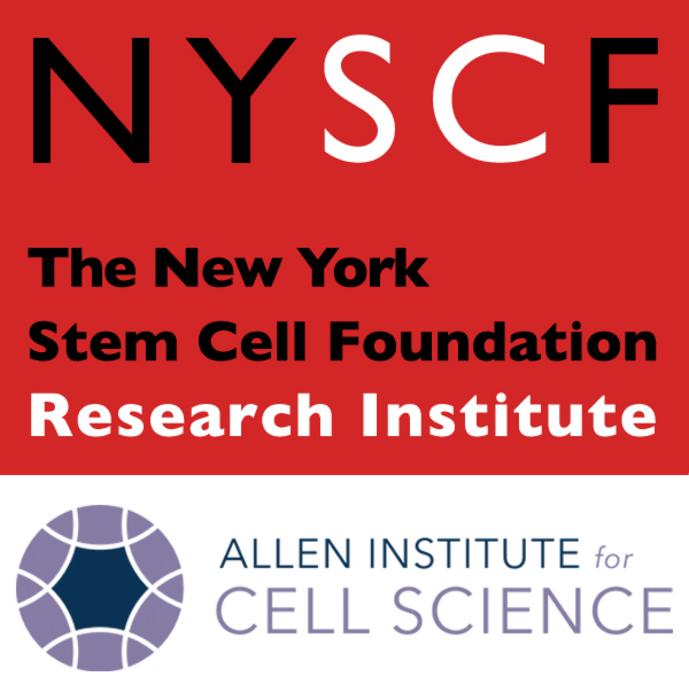Seattle, WA and New York, NY—September 4, 2024—Today, the Allen Institute for Cell Science and New York Stem Cell Foundation (NYSCF) announced a pioneering collaboration to address this critical issue, combining two cutting-edge technologies to create more inclusive cellular models for studying disease. This partnership will introduce the Allen Institute for Cell Science’s structure tags into NYSCF’s collection of ethnically diverse stem cell lines. The result: an unprecedented resource that will enable researchers to examine disease mechanisms and potential treatments across a spectrum of populations previously excluded from scientific studies.

Credit: Allen Institute and New York Stem Cell Foundation
Seattle, WA and New York, NY—September 4, 2024—Today, the Allen Institute for Cell Science and New York Stem Cell Foundation (NYSCF) announced a pioneering collaboration to address this critical issue, combining two cutting-edge technologies to create more inclusive cellular models for studying disease. This partnership will introduce the Allen Institute for Cell Science’s structure tags into NYSCF’s collection of ethnically diverse stem cell lines. The result: an unprecedented resource that will enable researchers to examine disease mechanisms and potential treatments across a spectrum of populations previously excluded from scientific studies.
Disease knows no boundaries, but research often does. While illness affects all populations, our understanding of disease—and the effectiveness of treatments—varies dramatically across ethnic groups. This disparity stems from a longstanding bias in biomedical research, which has largely focused on European males, leaving much of our global population’s biology unexplored.
“For too long, biomedical research has overlooked the rich diversity of human biology,” said Jennifer J. Raab, president and CEO of NYSCF. “This oversight has real-world consequences, contributing to widening health disparities despite overall advances in medicine. This collaboration is a crucial step toward more equitable and effective healthcare for all.”
The initial phase of the collaboration will enhance 24 of NYSCF’s human induced pluripotent stem cell (hiPSC) lines, which include both healthy volunteers and patients with Alzheimer’s and Parkinson’s disease, whose burden is exponentially increasing in our aging population, from diverse ethnic backgrounds. These hiPSCs were created by reprogramming adult skin or blood samples to their stem cell state, using NYSCF’s automated platform for stem cell technology, the NYSCF Global Stem Cell Array®.
For this collaboration, NYSCF will use the Array® to gene-edit these diverse iPSC lines with Allen Institute for Cell Science’s structure tags, allowing scientists to visualize critical aspects of cellular behavior. They will then convert the tagged hiPSCs into neurons and astrocytes, two cell types centrally implicated in Alzheimer’s and Parkinson’s disease.
Notably, nine of these stem cell lines were derived from nuns, priests, and brothers participating in the Religious Orders Study/Memory and Aging Project (ROSMAP) at Rush University Medical Center through a collaboration between Rush University, NYSCF, and Mass General Brigham. This unique cohort provides valuable insights into aging and cognitive health, adding another layer of significance to the resource.
By integrating the Allen Institute’s cellular structure tags into these lines, the project aims to provide researchers with deeper insights into cellular biology that are inclusive and relevant to specific diseases, said Ru Gunawardane, Ph.D., executive vice president and director of the Allen Institute for Cell Science.
“We are thrilled to partner with the New York Stem Cell Foundation to combine their expertise in generating hiPSC lines at scale with our advanced organelle tagging and rigorous quality control protocols,” Gunawardane said. “I’m excited by the potential impact of this collaboration, which will create a diverse and accessible stem cell resource to advance our understanding of cell biology in both normal and disease states.”
Key aspects of the collaboration include:
- Integration of Allen Institute for Cell Science’s structure tags into 24 of NYSCF’s stem cell lines (12 healthy, 6 with Alzheimer’s, 6 with Parkinson’s)
- Creation of dual-tagged cell lines for enhanced study of cellular structures
- Differentiation of tagged stem cells into neurons and astrocytes for neurological disease research
This initial phase of this partnership will demonstrate the power of combining these technologies to examine multiple cellular structures across diverse ancestral backgrounds and cell types. Future phases aim to expand the scope to include additional diseases and minority groups, develop new tagging technologies, and integrate more complex cellular models such as organoids.
About the Allen Institute
The Allen Institute is an independent, 501(c)(3) nonprofit research organization founded by philanthropist and visionary, the late Paul G. Allen. The Allen Institute is dedicated to answering some of the biggest questions in bioscience and accelerating research worldwide. The Institute is a recognized leader in large-scale research with a commitment to an open science model. Its research institutes and programs include the Allen Institute for Brain Science, launched in 2003; the Allen Institute for Cell Science, launched in 2014; the Allen Institute for Immunology, launched in 2018; and the Allen Institute for Neural Dynamics, launched in 2021. In 2016, the Allen Institute expanded its reach with the launch of The Paul G. Allen Frontiers Group, which identifies pioneers with new ideas to expand the boundaries of knowledge and make the world better. For more information, visit alleninstitute.org.
About the New York Stem Cell Foundation
The New York Stem Cell Foundation (NYSCF) Research Institute is an independent non-profit organization accelerating cures and better treatments for patients through stem cell research. The NYSCF global community includes over 250 researchers at leading institutions worldwide, including the NYSCF-Druckenmiller Fellows, the NYSCF-Robertson Investigators, the NYSCF-Robertson Stem Cell Prize Recipients, and NYSCF Research Institute scientists and engineers. The NYSCF Research Institute is an acknowledged world leader in stem cell research and in the development of pioneering stem cell technologies, including the NYSCF Global Stem Cell Array®, which is used to create cell lines for laboratories around the globe. NYSCF focuses on translational research in an accelerator model designed to overcome barriers that slow discovery and replace silos with collaboration. For more information, visit nyscf.org.
###
Media Contact
David McKeon, Chief of Staff
New York Stem Cell Foundation
dmckeon@nyscf.org
Peter Kim, Sr. Manager, Communications and Media Relations
Allen Institute
peter.kim@alleninstitute.org
Subject of Research
People



